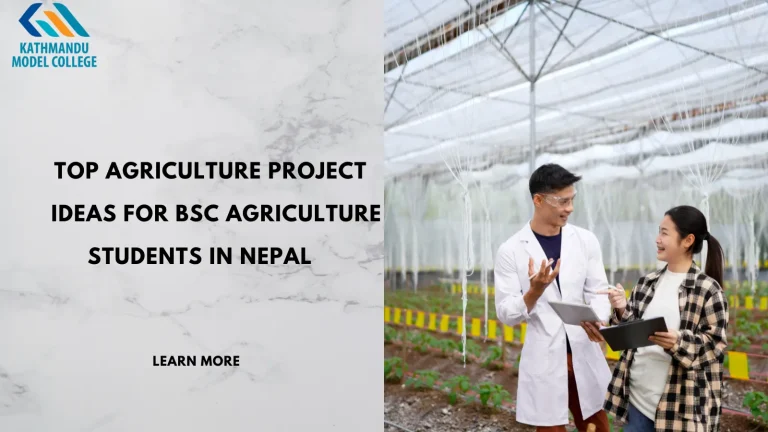
Is BSc.Agriculture Still Relevant in 2025 & Beyond?
Agriculture is the backbone of human civilization, providing food, raw materials, and livelihood since ancient ages.
It is without a doubt that it plays a vital role worldwide, and more so in Nepal, which has recognized itself as an agricultural country.
Agriculture has been one of the most common livelihoods of Nepalese people and has been playing a crucial role in economic growth and food security.
But with the rise of technology, changing climates, and the shift in people’s perception of agriculture as a “lesser occupation”, the doubt among students wanting to pursue BSc Agriculture if it is and will be relevant in the future is inevitable to rise.
In this blog, we will discuss the importance, opportunities, evolution of the field, and future scope that studying BSc Agriculture will offer, to hopefully clear the doubts in students’ minds, and why it remains a strong choice for students in this age.
Learn more about BSc. Agriculture in Nepal: Course Overview, Admission Process, Duration & Curriculum
Importance of Agriculture with a Modern and Scientific Approach
The approach to Agriculture still remains more traditional in comparison to what is the trend across the world.
Although the traditional methods were what sustained the needs for in that time, the needs and demands have increased and evolved.
So, the approach to agriculture also needs to be revolutionized to maximize the production and fully meet the potential that the agricultural industry of Nepal holds.
This is one of the major objectives of BSc. Agriculture, to provide students with knowledge of different fields of agriculture to approach it in a more modern and efficient manner.
The importance of why Agriculture in Nepal should be approached with modern and scientific techniques:
- To produce high-yielding seeds and increase crop production and food security with improved irrigation and other farming tools.
- To incorporate techniques such as greenhouse farming, drip irrigation, precision farming, and more to reduce risks from floods and droughts.
- To make agriculture interesting and attractive for new generations with mechanization, digital advisory apps, and agritech startups.
- To make agriculture sustainable by increasing awareness about the benefits of organic farming, bio-fertilizers, and eco-friendly pest control to protect soil and the environment.
- To increase the growth of agribusiness in Nepal and promote local goods across different countries.
- To improve efficiency using drones, soil testing kits, and mobile-based tools.
What you learn in BSc Agriculture
The Bachelor of Science in Agriculture is a four-year undergraduate degree in Nepal offered by Tribhuvan University, Agriculture and Forestry University, and other affiliated universities.
The course prepares for modern agriculture by combining theoretical knowledge and practical training.
The key learning areas include:
Subjects | Contents |
Crop Science | Principles of crop production, field crops, and horticulture |
Soil Science | Soil fertility, soil chemistry, soil physics, land use management, and conservation |
Animal Science | Livestock production, poultry, dairy science, and animal nutrition |
Agricultural Economics & Agribusiness | Farm management, marketing, entrepreneurship, and agricultural policy |
Plant Protection | Entomology, plant pathology, weed management, and integrated pest control |
Biotechnology & Genetics | Plant breeding, genetic engineering, molecular biology, and seed technology |
Natural Resource Management | Forestry, watershed management, agro-ecology, and sustainable farming |
Engineering & Technology | Farm machinery, irrigation systems, post-harvest technology, and renewable energy in agriculture |
Extension & Rural Development | Communication, rural sociology, agricultural extension services, and community development |
Research & Practical Training | Fieldwork, lab experiment, internships, and final-year thesis project. |
Learn more about Core Subjects in B.Arch: What you will study
Future Scope for BSc. Agriculture Graduates
As farming is shifting towards a modern and scientific manner, the scope of BSc.Agriculture graduates is growing at a steady rate in Nepal.
In addition to the conventional roles, you can also work as agriculture officers, livestock development officers, and plant protection specialists.
NGOs and INGOs also search for BSc.Agriculture graduates to work in food security, rural development, and climate adaptation.
Private companies like seed and fertilizer companies, food industries, and agribusiness startups, have also increased the job opportunities for BSc.Agriculture graduates.
Graduates also often become entrepreneurs and start commercial farms, organic ventures, or agritech businesses.
With Nepal prioritizing food security and sustainable agriculture, the opportunities for skilled agricultural professionals will definitely be increasing even more.
If you want to venture abroad, gaining a BSc. Agriculture degree gives the opportunity to explore higher education and research opportunities in developed countries.
You can pursue higher education in agriculture, biotechnology, or agribusiness, and find roles in modern farming, agritech companies, and organizations.
Top Career Roles for Graduates
Role | Approximate annual salary in Nepal (NPR) |
Agricultural Manager | 8,00,000-22,00,000 |
Environmental & Agricultural Scientist/ Research Scientist | 8,50,000-23,00,000 |
Agricultural & Food Scientist | 8,20,000-21,00,000 |
Farm Manager | 6,60,000-15,70,000 |
Researcher (general) | 3,00,000-12,00,000 |
Agricultural Officer (NGO/ Private/ Government) | 6,00,000-12,00,000 |
Extension Agent/ Agricultural Advisor | 6,00,000-10,00,000 |
Know more about BSc.Agriculture v/s Diploma in Agriculture: A Comparative Guide
Limitations
Although the scope for agriculture seems hopeful, it is not without challenges, some which are:
- Nepal lacks modern labs and funding for innovation, making research facilities limited.
- The infrastructure in Nepal like irrigation, storage, and transport are weak.
- The majority of farmers are of the older generation and have difficulty adopting advanced farming techniques.
- The job opportunities in government and private sectors are less for now.
- Due to climate change and issues resulting from global warming, agriculture is vulnerable to floods, droughts, and extreme weather conditions.
- You might find a harder time finding investments for agribusiness startups.
Who should study Agriculture?
- If you enjoy and understand science and nature, and particularly biology, the environment, and like working with plants and animals.
- If problem-solving is your forte and you look forward to tackling issues such as food security, climate change, and sustainable farming.
- If you want to start an agribusiness, organic farm, or agri-tech startup.
- If you feel passionate about helping farmers, improving rural livelihood, and contributing to national development.
- If you are interested in technology and want to apply it to the innovation and improvement of drones, smart irrigation, biotechnology, and modern farming tools.
- If you feel deeply passionate about sustainable practices, biodiversity, and eco-friendly solutions.
Future of Agriculture Education
Agriculture education will always be relevant, since agriculture is needed to produce the basic requirement for living: FOOD.
Agriculture education incorporates traditional farming techniques and improving them by blending science, technology, and business.
In the future, the course will revolve around modern innovations in biotechnology, climate-smart farming, and digital agriculture to ultimately improve efficiency and product yield.
The course should also be able to address and provide students with knowledge to tackle challenges like food security, climate change, and resource management.
Read more about Is ACCA Still Relevant in 2025 & Beyond?
Conclusion
In the end, BSc.Agriculture still remains and will remain a relevant course in 2025 and beyond.
The graduates of BSc.Agriculture are the key to modernizing farming, boosting agribusiness, and supporting rural development.
It is the path to address global and local challenges like hunger, climate change, and sustainability, and work towards handling them.
The challenges presented by limited infrastructure and job competition are present, but with a mindset to adapt and innovate, the future for BSc.Agriculture graduates is promising.

























